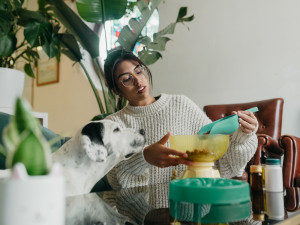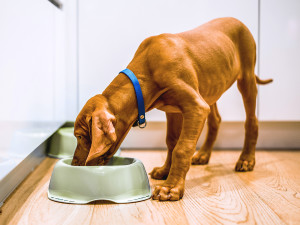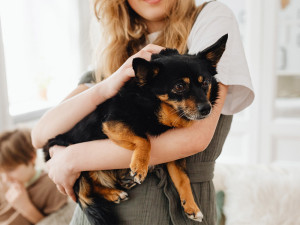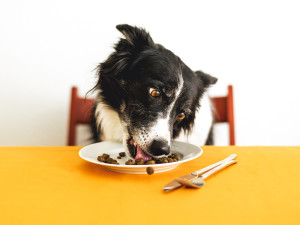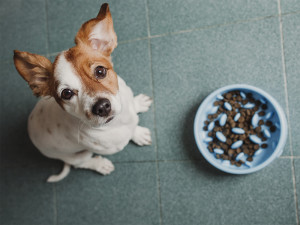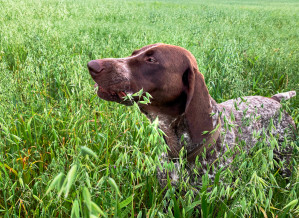How Long Can Dogs Go Without Eating?
If you ask them, they would say they should be eating always. But here’s the truth.

Share Article
In This Article:
How Long Can Dogs Go Between Meals? Why Is My Dog Not Eating? Signs of an Eating Disorder Not Eating Food Not Drinking Water How to Stimulate Appetite
Most healthy adult dogs can go a day without food, as long as they are still drinking water. Individual factors like age, breed, size, health, and activity level can affect how long a dog can go without eating before suffering ill effects. Smaller dogs and puppies generally have less fat reserves and need food and water more frequently.
How long can my dogs go between meals?
For most dogs, missing a meal occasionally is not a huge cause for concern. But dogs may experience bilious vomiting if they go too long without eating. Bilious vomiting occurs when a dog vomits bile after an extended period without food. Dogs can also experience nausea while their stomachs are empty. For some dogs, bilious vomiting can develop in the time between dinner and breakfast. The impact of missing meals can vary based on the individual dog’s health and age. Young, senior, underweight, or generally unhealthy dogs may exhibit adverse effects sooner than healthy adult dogs.
A healthy adult dog can go without food for a few days without major issues, as long as they are drinking water. But dog parents should not wait that long to seek veterinary care. After approximately three to five days without proper nutrition, a dog’s body may start using less-than-ideal protein sources, potentially leading to health complications.
Do different foods affect hunger differently?
Different elements of a dog’s diet may impact hunger levels. For example, highly digestible fibers help increase satiety (feeling “full” and not hungry) in dogs. Healthy carbohydrates (like whole grains) and protein may help regulate levels of ghrelin, the “hunger hormone.” Ghrelin is produced by the stomach and tells the brain that the body is hungry and wants to eat. While different components of a dog’s nutrition can impact their appetite, ensuring dogs receive a balanced and complete diet is essential for their overall wellbeing.
Why is my dog not eating?
Picky eating: Dogs can develop preferences for specific flavors, textures, and moisture levels in their food. While some dogs favor dry kibble, others love the texture and aroma of canned food. Transitioning to a new diet might not appeal to dogs accustomed to their regular food. Some dogs have mastered the power of puppy eyes and will hold out for a taste of what’s on your plate instead of the food in their own bowl.
Stomach upset: Eating new or inappropriate foods can lead to nausea, gas, and decreased appetite. Queasiness can make a dog skip a meal, but it should be temporary.
Medical condition: Any illness can affect appetite. Loss of appetite in dogs with chronic conditions may be an indication that the condition is progressing.
Pain associated with eating: Eating is less fun when it hurts to chew or swallow. Dogs with dental or esophageal issues may not want to endure discomfort associated with meal time.
Anxiety: Dogs experiencing stress and anxiety may not want to let their guard down to eat.
Signs of starvation or appetite-related illness
Lack of food intake can lead to malnutrition, and chronic malnutrition can lead to starvation. When a dog is truly starving, their body will undergo a series of changes to cope with the lack of food. As starvation progresses, organs like the kidneys, liver, and heart stop functioning at full capacity, decreasing the dog’s overall health. Signs of starvation in dogs include:
Weight loss
Loss of muscle mass and body fat
Poor coat and skin quality
Poor stool quality
Lack of energy
Pet parents should be aware of refeeding syndromeopens in new tab. Refeeding syndrome can occur when a starving or severely malnourished dog is fed a generous amount of food in a short amount of time. While this can seem like the kindest act for the dog, it can have harmful effects. The body can develop severe electrolyte imbalances, red blood cell destruction, and organ failure. If caring for a malnourished dog, consult a veterinarian for nutritional guidance.
What happens if your dog stops eating food for more than a day?
Healthy adult dogs can go without eating for a day without any significant consequences. In fact, withholding food may be recommended for dogs recovering from surgery or severe gastrointestinal disease. Young puppies, senior dogs, and toy breeds may experience ill effects like low blood sugar if they do not have adequate energy reserves. Dogs with underlying diseases, like diabetes mellitus, can experience disruptions in their condition if they go too long without food.
What happens if your dog stops drinking water for more than a day?
Going without water is more detrimental to the body than going without food. A day without water is enough time for a dog to become dehydrated. The body uses water to function, and dehydration occurs when the body is losing more water than it’s taking in.
Mild dehydration can cause lethargy, dry gums, and decreased urine output. As dehydration progresses, it causes a reduction in the volume of blood circulating in the body, leading to a reduction of oxygen being delivered to tissues and organs, or hypovolemic shock. Dogs experiencing additional fluid loss through vomiting, diarrhea, or excessive urination in addition to not drinking water are at higher risk for developing severe dehydration or hypovolemic shock. Symptoms of hypovolemic shock include:
High heart rate
Pale gums
Low blood pressure
Sunken eyes
Weakness
Collapse
How to stimulate your dog’s appetite
Eating is a natural behavior, and most dogs shouldn’t have to be convinced to do it. If your pup is being reluctant to eat or turning their nose up at food, consider these options:
Appeal to their senses: Add a little water and warm up food to enhance the aroma.
Provide some privacy: Anxious dogs may need a quiet space to feel comfortable enough to eat.
Hand-feed: Dogs know the best treats come straight from their parents. Try hand-feeding to encourage food intake.
Seek medical attention: A sudden loss of appetite is not normal, so consult with your vet to figure out what’s up.
Consider medication: Dogs living with chronic diseases like kidney disease, heart disease, and cancer may develop decreased appetite and weight loss. Prescription appetite stimulants can help these pups skip fewer meals.
FAQs (People also ask):
How long will a dog normally go without eating when they’re sick?
There’s no set time that dogs will stop eating when they’re sick. Some dogs will stop eating until they’ve recovered from their illness while others will gladly eat throughout their recovery.
How long will a dog normally go without eating after surgery?
After surgery, many dogs may not have much of an appetite, and food is often withheld until well after the effects of anesthesia have worn off. Depending on the nature of the surgery, dogs can typically start eating six to 24 hours after the procedure.
How long will a dog normally go without eating when they are dying?
Dogs facing terminal illness may or may not stop eating. If a chronically ill dog has gotten to the point where they will not accept any food, it may be a signal to discuss quality of life with a veterinary professional.
How can I keep my dog from constantly begging for food?
Dog parents can help curb begging behavior by resisting the urge to give in to puppy eyes, maintaining a regular feeding schedule (before or during their own meals), and being consistent.
References:
Bilious Vomiting Syndrome in Dogs: Retrospective Study of 20 Cases (2002-2012)opens in new tab
Impact of Nutrition on Canine Behaviour: Current Status and Possible Mechanismsopens in new tab
EMS Canine Evaluation and Treatment of Dehydrationopens in new tab
Refeeding Syndrome: What it Is, and How to Prevent and Treat Itopens in new tab

Dr. Alycia Washington, DVM, MS
Alycia Washington, DVM, is a small animal emergency veterinarian with over ten years of experience based in North Carolina. She works as a relief veterinarianopens in new tab and provides services to numerous emergency and specialty hospitals. She also works as a veterinary writer with a focus on educating pet owners, and is the author, under the name A. C. Washington, of the children’s book Dr. Jett, Monster Vet.
Related articles
![woman holds small dog with upset stomach]()
Um, What Did Your Dog Just Eat?
A vet’s-eye-view of an all-too-common problem.
![Side view of a cute hungry dog standing next to a red bowl with food in a studio with white background]()
How to Get a Dog to Eat
You can’t appease your picky new dog with chicken nuggets like you can with your toddler. Here are some things you can do.
![Border Collie digging into a plate of dog food while seated at a yellow table]()
How You Can Easily Manage Your Dog’s Weight
Keep your pup’s weight down, and you could add years to their life. What’s better than that?
![Puppy looks up while sitting next to a puzzle toy with food.]()
How to Slow Down a Dog Who Eats Too Fast
Plus 6 stylish slow-feed dog bowls.
![Kurzhaar's dog eats grass, oats, happy puppy playing in the meadow]()
Why Do Dogs Eat Grass?
Your pup is literally vegging out—when it’s no big deal and when to worry.
![Owner serving dog food]()
Your Dog’s Food Aggression Isn’t Cute — Here’s How You Can Work On It
No longer associate feeding time with growling time.
![brown puppy eating food out of green bowl]()
A Digestible Guide to Healthy Dog Food for Your New Pup
How to pick the right grub for your dog when there are So. Many. Choices.

